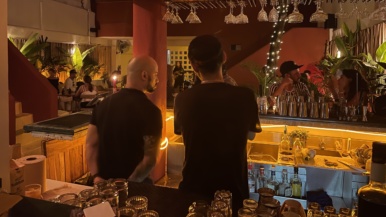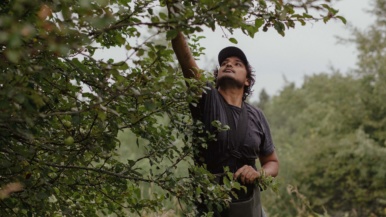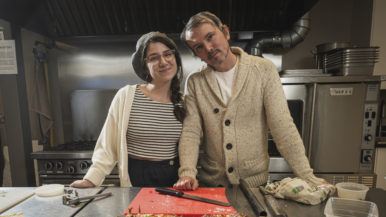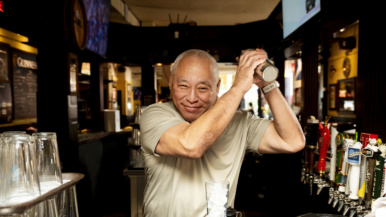I never learned to read properly in school. It wasn’t until I went to prison that I realized what I was missing

As a kid, I had a hard time reading and writing. Letters and numbers looked backward to me, and I was always falling behind my classmates. I was officially diagnosed as dyslexic when I was eight. It was humiliating. My classmates made cracks and only stopped when I beat up a kid who was making fun of me. The summer after Grade 9, I took a part-time job working for my dad as a tire technician. I was making $150 a day—a fortune for a teenager. When I was offered a full-time position, I didn’t think twice about accepting it. At age 16, I dropped out of school and never looked back.
Life was pretty good for the next few years. I started my own company, MS Tires, and became a father. In 2013, my wife and I purchased our first house, in Brampton, and she got pregnant. Then, one night on the town changed the course of my life completely. I was at a club in downtown Toronto. On our way out, my friend decided to relieve himself on a staircase that led to an underground parking garage. A security guard intervened, and the situation escalated. The next thing I knew, my friend was at the bottom of the stairs and I was on top of the guard, punching him in the jaw.
When I was charged with aggravated assault, my life quickly spiralled out of control. While I was out on bail, I hit a woman with my car. I panicked and fled, then turned myself in after a few hours. That night, I found out she had died. I raised $11,000 toward the funeral costs, but I was still consumed with guilt. In 2015, I was sentenced to 12 months at Toronto East Detention Centre for the assault, plus another five for leaving the scene of the car accident. My family came to my sentencing, including my pregnant wife and my five-year-old son. I wasn’t allowed to hug either of them goodbye.
For the first two months of my sentence, my unit was constantly on lockdown, and I was stuck in my cell for 23 hours a day, seven days a week. I was only allowed out to shower and jockey for the phone with my fellow inmates. Eventually, I was assigned a job in the prison’s kitchen, where I spent every day from 7 a.m. to 3 p.m. cooking for the other inmates. The rest of the time, I signed up for anything I could—bible studies, a harm-reduction course—to make the hours go faster. One day, a corrections officer told me about Literal Change, a non-profit literacy program for inmates. She had seen some of the letters I had written to friends and family, and thought I would benefit from it. I decided to give it a try. For me, it was just another way to pass the time.
I met with Robyn, one of the program’s co-founders, one-on-one twice a week. At first, the lessons were challenging. For so long I had relied on my phone and computers to correct my spelling. Suddenly I had to think for myself. Every session, Robyn would teach me 10 new vocabulary words, which I would learn to spell and use in sentences. We went over everything, from long and short vowel sounds to parts of speech. I always had homework—reading assignments, writing stories, using vocabulary words in poems—and I would start on it as soon as I was back in my cell. Within weeks, I was looking forward to my lessons. The program was an opportunity to work with someone who believed in me—someone who wanted to help.
Not long into the program, I could spot mistakes other inmates were making in their letters home. When I received letters from my family, I could pick out which words had been spelled incorrectly or where punctuation had been used in the wrong places—sometimes I thought about sending them back with corrections. That’s when I realized I was learning something. When I had free time, I used my new skills to write letters to my son and poems to my wife. She saved them all, putting each one in a protective plastic cover. Looking at the poems now, from the first one I wrote to the last, I can track the improvement in my writing. It’s unbelievable.
I continued working with Robyn right up to the end of my sentence. We’re still in touch; I’d like to get my GED, and she’s pushing me to earn my last six high school credits. Before I went to prison, my wife used to do all of my paperwork for my company; now I manage it myself. And if it weren’t for Literal Change, I’d still be reading just to get by—not to better myself and definitely not for fun. Now, when I pick up a book, I find it hard to put it down. I love Tony Robbins, and I’m currently reading Confessions of an Economic Hitman by John Perkins.
My daughter is only 15 months old, but my son is seven, so he’s learning how to read. And just like his dad, he’s having a hard time with it. A year ago, I would have been frustrated that I couldn’t give him the help he needs—who wants to admit to his own child that he can barely read? But it’s so much easier now. I’ve been doing the same exercises with him that I learned while I was in prison. It’s my turn to be the teacher.
Steven Richards owns a tire company in Brampton.
Email submissions to memoir@torontolife.com





